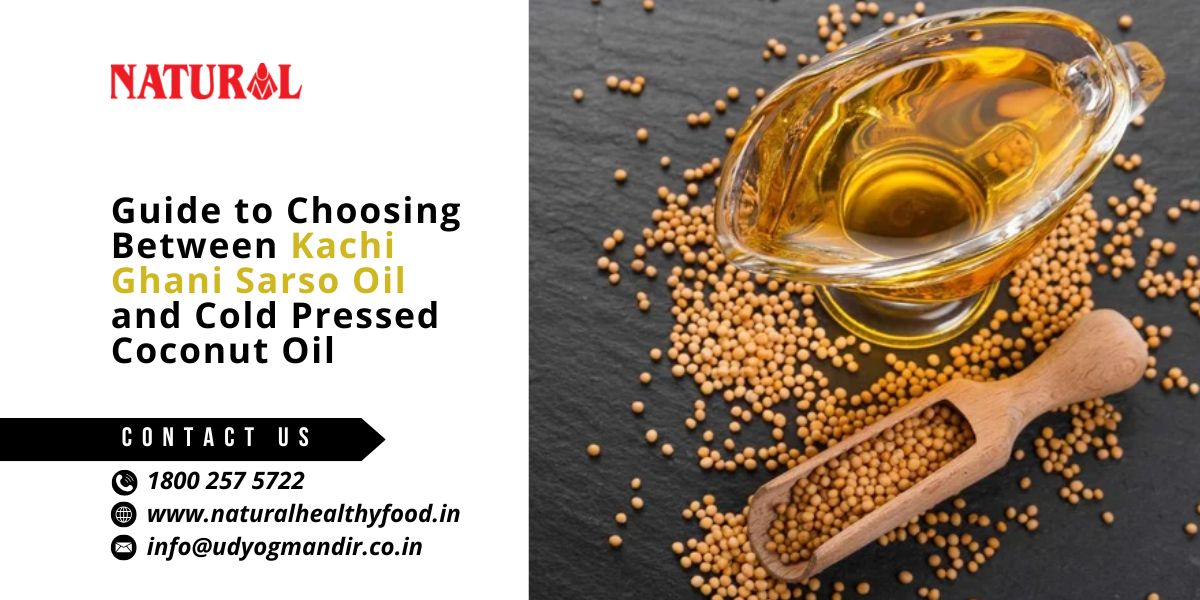 When it comes to cooking oils, the market is full of options, but two of the most widely appreciated choices for health-conscious consumers are kachi ghani sarso oil ↗ and cold pressed coconut oil. Both oils are known for their natural extraction processes and health benefits, making them popular in Indian kitchens. But how do you decide which one is better for your daily cooking needs?
When it comes to cooking oils, the market is full of options, but two of the most widely appreciated choices for health-conscious consumers are kachi ghani sarso oil ↗ and cold pressed coconut oil. Both oils are known for their natural extraction processes and health benefits, making them popular in Indian kitchens. But how do you decide which one is better for your daily cooking needs?
In this guide, we’ll help you understand the key differences between kachi ghani mustard oil and cold pressed coconut oil, their benefits, uses, and which one might be the right fit for your lifestyle and recipes.
Understanding the Basics: What Are These Oils?
Kachi ghani sarso oil, also known as ghani mustard oil, is extracted from mustard seeds using the traditional cold-press method, called “ghani” in India. This process ensures that the oil retains its natural nutrients, flavor, and strong aroma. It is especially common in northern and eastern parts of India, where it plays a central role in daily cooking.
On the other hand, cold pressed coconut oil is made by mechanically pressing fresh cococold-nut flesh without using heat, preserving the oil’s natural taste, aroma, and nutritional profile. It is widely used in South Indian cooking and is also popular for skin and hair care.
Nutritional Comparison
When comparing these two oils from a nutritional standpoint, each has its strengths:
-
Kachi ghani mustard oil contains a good amount of monounsaturated fats, omega-3 fatty acids, and natural antioxidants. It also has antibacterial and antifungal properties, making it a heart-healthy option for cooking.
-
Cold pressed coconut oil is rich in medium-chain triglycerides (MCTs), which are easily digested and converted into energy. It also has lauric acid, known for its antimicrobial benefits, making it suitable for both cooking and external use.
While both oils are healthy in their own way, your choice will depend on your dietary needs and cooking style.
Taste and Cooking Uses
One of the most important differences lies in taste and cooking applications.
-
Kachi ghani sarso oil has a strong, pungent flavor that enhances the taste of Indian dishes like sarson da saag, pickles, fish curry, and parathas. Its high smoking point makes it ideal for frying and sautéing.
-
Cold pressed coconut oil has a mild, sweet aroma and is perfect for dishes like coconut rice, vegetable stews, and chutneys. It also works well in baking or as a butter substitute in vegan recipes.
If you're cooking traditional Indian dishes from the north or east, pure kachi ghani mustard oil is likely your go-to. For lighter cooking, tropical recipes, or gluten-free baking, coconut oil may be a better choice.
Health Benefits
Let’s break down some of the key health benefits of each oil.
Kachi Ghani Sarso Oil ↗ Benefits:
-
Promotes heart health due to high monounsaturated fats
-
Acts as a natural preservative in pickles and traditional foods
-
Aids digestion and improves blood circulation
-
Provides relief from cold, cough, and skin infections when used externally
Cold Pressed Coconut Oil Benefits:
-
Supports metabolism and quick energy due to MCTs
-
Strengthens hair and nourishes the scalp
-
Moisturizes dry skin and helps treat fungal infections
-
Boosts immunity with its antimicrobial properties
Both oils are excellent in their own right and support various aspects of health, depending on how they’re used.
Regional Preference and Cultural Influence
Culture and geography also influence which oil you might prefer.
In North and East India, kachi ghani mustard oil has been a staple for generations. It’s not just used in cooking but also for body massage and Ayurvedic remedies. Families often look for the best kachi ghani mustard oil for daily meals and festive dishes.
In South India, cold pressed coconut oil dominates. From Kerala’s famous recipes to traditional hair oiling practices, coconut oil is part of everyday life.
That said, modern households across India are now blending traditions, using both oils for different dishes and purposes.
Which One Should You Choose?
Choosing between kachi ghani sarso oil and cold pressed coconut oil really depends on your culinary needs, taste preference, and health priorities.
-
Go for kachi ghani mustard oil if you love bold flavors, traditional North Indian recipes, and want a heart-healthy oil with antimicrobial benefits.
-
Choose cold pressed coconut oil if you prefer a milder flavor, cook light or tropical dishes, or want a multipurpose oil for skin and hair care.
You can also consider using both oils for different purposes—mustard oil for cooking and frying, coconut oil for baking and skincare.
Things to Look for When Buying
Regardless of which oil you choose, it’s important to buy from a trustworthy source. Look for:
-
Cold pressed or traditional ghani extraction methods
-
No added chemicals or preservatives
-
Proper packaging to avoid contamination
-
Brand reputation and customer reviews
For mustard oil, make sure it’s labeled as pure kachi ghani mustard oil, and for coconut oil, ensure it’s virgin and cold pressed.
Conclusion
Both kachi ghani sarso oil and cold pressed coconut oil are valuable additions to a healthy lifestyle when used in moderation and with the right dishes. If you’re looking for premium-quality oils that maintain purity and traditional methods, Natural ↗ offers a reliable range of edible oils suitable for all your kitchen needs.
Want to experience the benefits of pure cooking oils? Explore the range of premium oils from Natural, including the best kachi ghani mustard oil and virgin cold pressed coconut oil. Contact us ↗ now to place your order or learn more about our products.